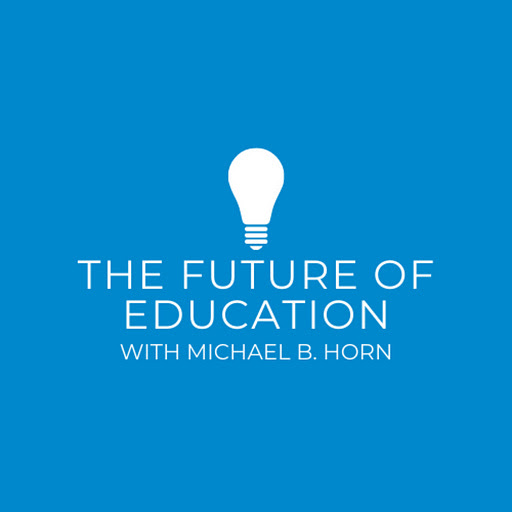March 23, 2023
Rethinking Sports Education in Schools
An item from a neo-liberal… This one is an item from a business professor with little direct experience in education, but who believes free market economic principles are the answer to education’s (and pretty much all other society’s social) problems.
Open in app or online If we’re serious about helping all individuals build their passions and fulfill their human potential, then we need to help them not just with their academics, but also focus on their health and wellness and their habits of success. A big part of that can and should be built on a foundation of fitness, which means instilling lifelong habits of fitness when they’re in K–12 schools. But that means some big changes in how we think about sports, PE and more in our society. To help unpack elements of this topic, Steve Mesler, an Olympic gold medalist and the co-founder and CEO of Classroom Champions joined me, alongside Andy Rotherham, a national leader in the world of education reform, the co-founder of Bellwether Education, and a member of the Virginia Board of Education among other roles. Steve and Andy’s passions for this topic really shone through in this conversation, in which we touched on everything from the reasons why sports are beneficial to students, how the high demands and desires to be great in one thing can be counterproductive, and why it’s necessary to make sure sports are fun and not just about the competition. The conversation rolled into a lot of important and controversial places, as it touched on everything changing the youth sports culture to the role of social-emotional learning (SEL) in schools.
As always, you can listen to the podcast, watch the video below, or read the transcript if you’re a paid subscriber.
Horn: I’ve long said that if we’re serious about helping all individuals do just that, then we need to help them not just with their academics, but also focus on their health and wellness and their habits of success. And a big part of that can and should be built on a foundation of fitness, which means instilling lifelong habits of fitness when they’re in K-12 schools. But that means some big changes in how we think about sports, PE and more in our society.
So, to help us think about this topic and frankly, the broader topic of preparing students to lead successful lives, we have two incredible guests today. First, we have a first on this show, we have an Olympic gold medalist in Steve Mesler. He won Gold in the 2010 Olympics in the four-man bobsled, but he also currently serves as the co-founder and CEO of Classroom Champions, which offers an award-winning social-emotional learning curriculum in K-8 schools.
We also have my friend Andy Rotherham joining us today. Andy, of course, has been a national leader in the world of education reform, and he has served in a variety of roles, really as a bridge across the various partisan bickering and silos. He’s the co-founder of Bellwether, which works to transform education systems to ensure systemically marginalized young people achieve outcomes that lead to fulfilling lives and flourishing communities. He writes the Eduwonk Blog, has been a columnist for Time, and serves on the Virginia Board of Education. You get the idea, two big deals here today. And with that, Andy, Steve, thank you so much for joining me. It’s great to see you both.
Rotherham: Great to be here. This is going to be fun.
Mesler: Thanks for having us.
Horn: Yeah, you bet. I just want to dive in with a macro question for you both really to set the table, which is, in both of your views, why are sports important to young people today? Andy, why don’t you go first and then Steve, you can jump in after.
Rotherham: Yeah. I mean, well, there’s a couple reasons. I say there’s like three, starting with a basic one. It’s fun. Sports are fun. They’re fun for kids, they’re fun for us to watch. They bring a lot. But more importantly, there’s a couple of really important things that happen with sports. One, we know kids who participate in sports and it’s particularly true of girls. And I have daughters who participate in sports, have better outcomes. And some of that is obviously just the math. If you’re spending time doing sports, that’s time you’re not spending doing other things. So it makes sense that some of the sort of behaviors we think about as being more at risk behaviors, you’d be less exposed to it just because of time. But even accounting for that, there are other things that lead to really good externalities and outcomes.
And I don’t think it’s surprising you see, particularly again among women, women who participate in sports achieving elsewhere in their lives at a very high level. And I think that’s because of that third thing. It gives you the ability to learn how to win, how to lose, how to communicate, how to work together, all kinds of skills that are just really important out there in the workplace and in life. And it lets you get them in a very authentic way. It’s not contrived, it’s not made up. You’re learning those things through real lessons. I mean, I’m on Steve’s board at Classroom Champions and we don’t want to spend the whole time talking about that. But as I segue to Steve on this question, that is part of what we do at Classroom Champions is sort of letting students see this happening in authentic ways with their mentors. Not contrived ways and made up, but in very real ways, see these kinds of things and learn from them. Steve, what would you add?
Mesler: Yeah, I mean, well first of all, wait a minute. We’re not talking about Classroom Champions the entire time here?
Rotherham: The bait and switch.
Mesler: I know mean it’s an incredibly important question, Michael, and I mean, I think honestly it leans back to your opening, which is thinking about how to help kids have a life that not only provides them academic opportunity, which then we know is whether you’re looking to break the cycle poverty, whether you’re just looking to get ahead of life or just do bigger things, that it really begins with academics. But I think the realization that it doesn’t begin and end with academics is where sport comes into play. Because ultimately, what else are we all doing here? What else are we all doing here? But to live rewarding lives that we can live longer, we can live happier, we can be healthy, we can think longer, we can do all these things.
And again, whether you’re talking about trying to help kids, whether it is in some of the communities that Classroom Champions serves in Camden, New Jersey or in rural Indiana, or whether you are talking about those maybe on the haves side of the American economy, ultimately I think sport is this demonstrable place for kids to see, just like Andy said, I mean, I’m going to echo something that Andy said, but ultimately it’s demonstrable.
Kids can see it happening whether they’re experiencing it themselves or not, and they’re participating. Look, sports isn’t for everybody. I’m okay with saying that, I’m comfortable with saying that. But the principles that sport teaches are for everybody. And when kids can see winning and losing happening, whether again on the field themselves or in others or in their role models, athletes still to this day right there with YouTube stars and TikTok stars athletes are those people. They’re the only consistent role models as we’ve kind of transitioned from a generation that participates and watches things on television to now can find their own role models as they please on the internet. And those role models are getting thrown in their faces in a way that wasn’t there when we were kids. Sports serves a purpose because again, the rules are clear. It’s an opportunity to follow, agree to rules.
And we have to remember, look, I spent eight years on the board of directors of the US Olympic and Paralympic committee, and if there’s one thing that I really took away from that, it’s all made up. It’s all made up. We all decided the line in football is out and the line in tennis is in, those are arbitrary things, but so are majority of the laws and so are the majority of the things that we do in life. And I think sport is this wonderful place where life kind of just mirrors there where we’ve all agreed to a set of rules, we’re going to follow them and the moment somebody doesn’t follow them, they either get thrown in a penalty box and they have to sit on the sidelines and be singled out in front of 20,000 people in the NHL. You’re sitting in a box just by yourself because you messed up and it reflects on that.
So I think that’s where, from a societal standpoint for sport, that’s what I really see the value on. And again, Andy I think did a great job talking about those things that go into the sport world.
LIKE
COMMENT
SHARE
No comments yet.
RSS feed for comments on this post. TrackBack URI
- SEO Powered Content & PR Distribution. Get Amplified Today.
- Platoblockchain. Web3 Metaverse Intelligence. Knowledge Amplified. Access Here.
- Source: https://virtualschooling.wordpress.com/2023/03/23/rethinking-sports-education-in-schools/
- :is
- $UP
- 000
- 8
- 9
- a
- ability
- About
- academic
- Accounting
- Achieve
- achieving
- across
- After
- ahead
- All
- alongside
- always
- American
- American economy
- among
- and
- android
- android app
- answer
- app
- ARE
- AS
- At
- athletes
- Authentic
- auto
- award-winning
- back
- bait
- basic
- BE
- because
- begin
- being
- believes
- below
- beneficial
- BEST
- Bet
- Better
- Big
- bigger
- Blog
- board
- board of directors
- Box
- Break
- BRIDGE
- bring
- broader
- build
- built
- business
- by
- CAN
- Category
- Center
- ceo
- Champions
- Changes
- changing
- clear
- Co-founder
- comfortable
- comment
- comments
- committee
- communicate
- Communities
- competition
- consistent
- controversial
- Conversation
- counterproductive
- Couple
- course
- Culture
- Currently
- Curriculum
- cycle
- data
- day
- Deals
- decided
- demands
- DID
- direct
- Directors
- Doesn’t
- doing
- Dont
- echo
- Economic
- economy
- Education
- either
- elements
- elsewhere
- ensure
- Entire
- Episodes
- Ether (ETH)
- Even
- everything
- experience
- experiencing
- exposed
- faces
- feedback
- field
- Find
- First
- fitness
- Focus
- follow
- Football
- For
- Foundation
- Free
- friend
- from
- front
- Fulfill
- fun
- future
- generation
- get
- getting
- girls
- gives
- Go
- going
- Gold
- good
- great
- guests
- happen
- Happening
- Have
- having
- Health
- healthy
- help
- helping
- here
- High
- Honestly
- How
- How To
- HTTPS
- human
- i
- idea
- identifier
- important
- in
- incredible
- incredibly
- Indiana
- individuals
- Internet
- iOS
- iOS app
- IT
- Jersey
- Job
- joined
- joining
- joining us
- jump
- kids
- Kind
- Know
- Laws
- lead
- leader
- LEARN
- learning
- Lessons
- Lets
- letting
- Level
- Life
- like
- Line
- Listening
- little
- live
- Lives
- Long
- longer
- Look
- looking
- lose
- losing
- Lot
- Macro
- made
- Majority
- make
- MAKES
- Market
- math
- means
- member
- Meta
- Michael
- minute
- models
- moment
- more
- National
- necessary
- Need
- New
- New Jersey
- NHL
- not spending
- of
- Offers
- Okay
- Olympic
- olympics
- on
- ONE
- opening
- Opportunity
- Other
- Others
- own
- P&E
- paid
- part
- participate
- participating
- particularly
- People
- Place
- Places
- plato
- Plato Data Intelligence
- PlatoData
- Play
- please
- podcast
- Post
- potential
- Poverty
- preparing
- presentation
- pretty
- principles
- problems
- Professor
- provides
- purpose
- question
- Read
- real
- realization
- reasons
- reduce
- reflects
- reform
- remember
- resource
- rewarding
- Risk
- Role
- roles
- Rolled
- rules
- Rural
- Said
- Schools
- sense
- serious
- serves
- set
- should
- show
- Simple
- site
- Sitting
- skills
- So
- Social
- societal
- Society
- some
- something
- spam
- spend
- Spending
- spent
- Sport
- Sports
- Stars
- Starting
- Steve
- Still
- Students
- success
- successful
- surprising
- Switch
- syndication
- Systems
- table
- TAG
- talking
- television
- tennis
- that
- The
- The Future
- the world
- their
- Them
- themselves
- These
- thing
- things
- Think
- Thinking
- Third
- three
- Through
- tiktok
- time
- to
- today
- together
- topic
- touched
- Transcript
- Transform
- true
- Ultimately
- under
- us
- value
- variety
- various
- Video
- views
- virginia
- wait
- Watch
- watches
- Way..
- ways
- WELL
- Wellness
- What
- whether
- which
- WHO
- win
- winning
- with
- Women
- Won
- wonderful
- WordPress
- Work
- work together
- Workplace
- works
- world
- would
- years
- young
- Your
- yourself
- youth
- youtube
- zephyrnet












![[REPOST] 2022 Survol national : Nature de la règlementation sur l’apprentissage en M-12](https://platoaistream.net/wp-content/uploads/2023/03/repost-2022-survol-national-nature-de-la-reglementation-sur-lapprentissage-en-m-12.jpg)
